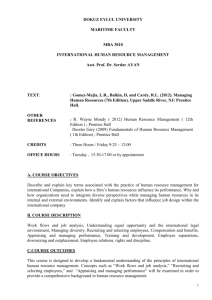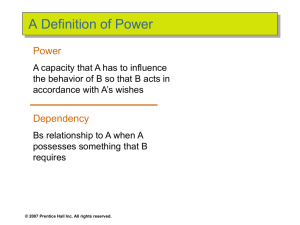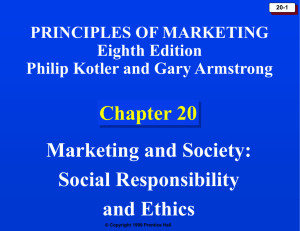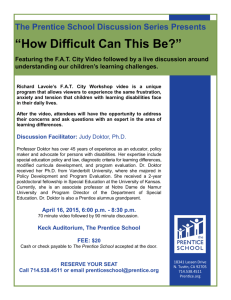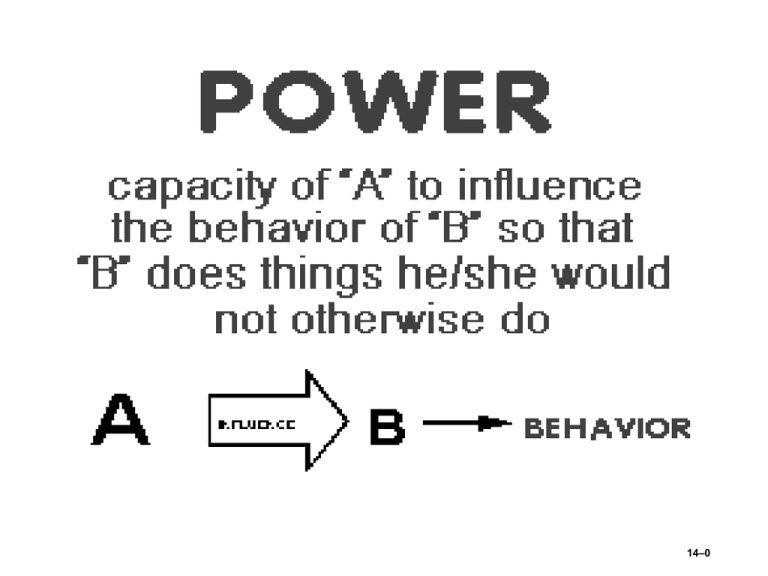
14–0
Power – meaning
Power is one’s ability to influence other people
Power is an exchange relationship between an agent & a
target
Agent is a person who uses the power and target is the receipt of
the attempt to use power
According to Stephen. P. Robbins, “Power us defined as the ability
to influence and control anything that is of value of others”
According to G.R.Salancik and N.Pfeffer, “ Power is the ability to get
things done the way one wants them to be done”
A Definition of Power
Power
A capacity that A has to influence
the behavior of B so that B acts in
accordance with A’s wishes.
A
B
Dependency
B’s relationship to A when
A possesses( have)
something that B requires.
14–2
Nature of Power
1) Reciprocal Relationships:
Power relationships in an organization is reciprocal
because it exists in a relationship between two or more
persons . It is based on two way traffic influencing
others and being influenced. Therefore it is incorrect to
say that power exists with top ranking officials or with
the managers.
2) Dependency Relationships:
This is an important characteristics of power. When a
person is more dependent on a person more power is
exerted on him
3) Power is specific:
Power is specific in the sense that specific person can
exercise it on some specific occasions only. Power
cannot be exercised at all times and by all the people
© 2005 Prentice Hall Inc. All rights reserved.
14–3
Nature of Power
4) Unequal Distribution:
Power is not equally distributed among members since
different individuals have varied type and levels of knowledge,
experience, education, skill and hierarchical authority. They
are therefore likely to differ in terms of their power to influence
others.
5) People differ in terms of values:
In terms of their values, people differ and on the gain and
exercise of power. Research indicates that the amount of
power exercised by an individual is the function of his on her
power motive
6) Resistance to change:
Power holders resist attempts to change the distribution of
power. Person who strives for power and are able to acquire it,
are willing to share it with other members of the group
© 2005 Prentice Hall Inc. All rights reserved.
14–4
Nature of Power
7) Power losers attempts to form coalition:
Power losers usually attempt to increase their power
individually and if they failed, form a coalition. To regain
influence by becoming a power holder, he loses attempt to
build personal power base, though it may be difficult, risky and
costlier
8) Power can expand or contract:
It will depend on the person who habituated to exercise power
to expand it or contract. When a person reaches a higher
position his legitimate power attached with his position
simultaneously increase. When such a person is shifted from
one department to another his power contracts
© 2005 Prentice Hall Inc. All rights reserved.
14–5
Sources of Power
Coercive Power
Reward Power
Legitimate Power
Expert Power
Referent Power
Reuters Archive Photos
Consequences of Power
Sources
of Power
Consequences
of Power
Expert
Power
Commitment
Referent
Power
Legitimate
Power
Compliance
Reward
Power
Coercive
Power
Resistance
SOURCES OF POWER
1)Formal Power
Is established by an individual’s position in an
organization; conveys the ability to force or reward,
from formal authority, or from control of information.
a)Coercive Power
A power base dependent on
fear.
Individuals ability to influence
others behaviors by punishing their
undesirable behavior
e.g. dismissal, suspension,
demotion
14–8
SOURCES OF POWER
b)Reward Power
Individual’s ability to influence
other’s behavior by rewarding
their desirable behavior.
Compliance achieved based on
the ability to distribute rewards
that others view as valuable.
E.g. pays, promotions,
recognition
© 2005 Prentice Hall Inc. All rights reserved.
14–9
SOURCES OF POWER
c)Legitimate Power
The power a person receives as a
result of his or her position in the
formal hierarchy of an
organization.
Manager’s ability to influence sub
–ordinates behavior because of
the managers formal position in
org.
© 2005 Prentice Hall Inc. All rights reserved.
14–10
SOURCES OF POWER
d)Information power:
The power that stems from access to and control over
information. Informational power comes from access to facts and
knowledge that others find useful or valuable
© 2005 Prentice Hall Inc. All rights reserved.
14–11
SOURCES OF POWER
2)Informal Power: The power that comes from
individual characteristics is called the informal power
a)Expert Power
Influence based on special skills or knowledge.
Individuals ability to influence others behavior because
of recognized competencies, talents or specialized
knowledge
b)Charismatic Power
An extension of referent power stemming from an
individual’s personality and interpersonal style.
SOURCES OF POWER
c)Referent Power
Individuals ability to influence
other’s behavior as a result of being
respected, admired, liked.
Influence based on possession(
control) by an individual of desirable
resources or personal traits.
Individuals strength
14–13
SOURCES OF POWER
3)Sources of Functional and Divisional Power
– Ability to control uncertain contingencies
• A contingency is an event or problem that could occur and must be
planned for, by having people and resources in place to deal with it.
– Irreplacability
• A function or division gains power when it is irreplaceable and no
other function or division can perform its activities
– Centrality
• The power of a function or division also stems from its importance, or
centrality, to the organization that is how central it is to the
organization’s operations and the degree to which it lies at the center
of information flows
– Ability to control and generate resources
• The ability to control and generate resources for an organization is
another source of functional and divisional power
© 2005 Prentice Hall Inc. All rights reserved.
14–14
SOURCES OF POWER
4)Structural Sources of Power :I
mportant structural sources of power include knowledge, resources, decision
making and networks.
a)Knowledge as Power:
The concept of knowledge as power means that individuals, teams, groups,
or departments that possess knowledge are crucial in attaining the
organisation's goals. Intellectual capital represents the knowledge, knowhow, and competency that exist in the organisation. This intellectual capital
can provide an organisation with a competitive edge in the marketplace.
b)Resources as Power:
Organizations need a variety of resources, including money, human
resources, equipment, materials, and customers to survive. The importance
of specific resources to an organisation's success and the difficulty in
obtaining them vary from situation to situation. The departments, groups, or
individuals who can provide essential or difficult-to-obtain resources
acquire more power in the organisation than others.
© 2005 Prentice Hall Inc. All rights reserved.
14–15
SOURCES OF POWER
c) Decision making as Power:
The decision making process in an organisation creates more or less power
differences among individuals or groups. Managers exercise
considerable power in an organisation simply because of their decision
making ability. Although decision making is an important aspect of power in
every organisation, cultural differences make for some interesting
differences in the relationship. For example, in Chinese organisation,
decision making power was more decentralised in manufacturing firms than
in service organisations. The reverse was true in British firms, with power
being more decentralised in the service organisations than in the
manufacturing firms.
d) Networks as Power:
The existence of structural and situational power depends not only on access
to information, resources and decision making, but also on the ability to get
cooperation in carrying out tasks. Managers and departments that have
connecting links with other individuals and departments in the organisation
will be more powerful than those who don't have.
© 2005 Prentice Hall Inc. All rights reserved.
14–16
Power Tactics
Power Tactics
Ways in which
individuals translate
power bases into
specific actions.
Influence Tactics:
• Legitimacy
• Rational persuasion(
balanced)
• Inspirational appeals
• Consultation- discussion
• Exchange
• Personal appeals
• Ingratiation- humble way
• Pressure- positive
• Coalitions
• Bargaining, sanction,
14–17
Nine Generic Influence Power Tactics
Rational
persuasion.
Trying to convince
someone with reason, logic, or facts.
Inspirational appeals. Trying to build
enthusiasm by appealing to others’ emotions,
ideals, or values.
Consultation. Getting others to participate in
planning, making decisions, and changes.
Ingratiation. Getting someone in a good mood
prior to making a request; being friendly, helpful,
and using praise or flattery(sweet talk)
Personal appeals. Referring to friendship and
loyalty when making a request.
Nine Generic Influence Tactics
Exchange. Making express or implied promises and
deal favors.
Coalition tactics. Getting others to support your effort
to persuade someone.- unions
Pressure. Demanding compliance or using
intimidation(fear) or threats.
Legitimating tactics. Basing a request on one’s
authority or right, organizational rules or polices, or
express or implied support from superiors.
Power Centres
Power centre is a person who is in close vicinity of higher
management and whom management trusts and takes
feedback from. The power centres people may be from different
caters and it need not be the person who is holding higher post
in the organization. It may be the boss relatives, friends or
driver etc
Ways to use power centres:
1) Destabilise:
Power centre creates a crisis or hires a change agent that
will be empowered to shake people up. It will help to improve
the flexibility of people to work in the organization. Power
centres can be used to weaken the environment
2) Communicate:
It clearly articulates an inspired vision for the change and
overall organization. This helps to communicate views of one
© 2005 Prentice Hall Inc. All rights reserved.
14–20
person
to another
Power Centres
3) Defuse Resistance:
It also exploits channels of influences like relationship power.
This results in fragmentation of old alliances, causing the
organization to create new alliances and establish power at
lower levels within the ranks
4) Be Deliberate:
Power centres create an insight to know the human behaviour
in a better way and do not overlook them. It helps to understand
the needs and self interests of staff members. By using some
power to satisfy a portion of those needs. It is possible to create
alignment with the transformation process
5) Dominate Sequence:
It becomes necessary as leader to determine how the change/
transformation process will begin. Power centre dominates
forward as a way to lead the path for the transformation
© 2005 Prentice Hall Inc. All rights reserved.
14–21
process
Power Centres
7) Create Definitive systems:
Leaders need to be at every level of the organization to
champion the transformation process. Those who have been
selected as transformation leaders will need the appropriate
training to know how they should behave, what is expected of
them, how to operate in the changing environment and how to
use their own power to carry out the change sequence.
© 2005 Prentice Hall Inc. All rights reserved.
14–22
POLITICS
Organizational Politics are the activities managers engage in
to increase their power and use it to achieve their goals.
According to Stephen Robbins,”Politics in organization are
those activities that are not required as part of one’s formal
role in the organization, but that influence, or attempt to
influence the distribution of advantages and disadvantages
within the organization”
Politics arises when employees aspire to achieve
something beyond their authority and control in a short
span of time
Lack of supervision and control at the workplace
Too much of gossip at work lead to politics
Arrogant superiors
Jealous
© 2005 Prenticecolleagues
Hall Inc. All rights reserved.
14–23
POLITICS
LEVEL OF POLITICAL ACTION:
1) Individual level:
At the individual level, personal self interest are pursued by
the individual.
2) Coalition level:
People with common interests can become a political coalition
In an organizational context, a coalition is an informal group
bound together by the active pursuit of a single issue.
Coalitions may or may not coincide with formal group
membership.
3) Network Level:
Networks are loose associations of individuals seeking social
support for their general self interests. Politically, networks are
people oriented, while coalitions are issue oriented.
© 2005 Prentice Hall Inc. All rights reserved.
14–24
To make effective use of organizational politics, leader must
be aware of specific political tactics & strategies
There are three major tactics
Gaining Power
Building relationship with superiors & co-workers
Avoiding political blunder
© 2005 Prentice Hall Inc. All rights reserved.
14–25
1)Gaining Power
All political tactics are aimed at gaining & maintaining power,
even the power to avoid a difficult assignment.
Five techniques to gaining power
Develop power contacts
Control vital information
Control lines of communication
Bring in outside expert
Make a quick showing
© 2005 Prentice Hall Inc. All rights reserved.
14–26
2)Building relationship
Much of organization politics involve building relationship
with network member who can be helpful now or later
Strategies for building relationship
Make & manage impression on others
Ask satisfied customers to contact your boss
Be courteous, pleasant & positive
Flatter others sensibly
Ask advice
Send thank you notes to large number of people
© 2005 Prentice Hall Inc. All rights reserved.
14–27
3)Avoiding political blunders
A strategy for retaining power is to refrain from making
power eroding blunders which can prevent one from attaining
power
Criticizing the boss in public forums
By passing the manager
Overt display of disloyalty
Being or perceived as a poor team player
Act in haste
Declining an offer from top management
Burning your bridges
© 2005 Prentice Hall Inc. All rights reserved.
14–28
Types of Political Activity
Attacking or blaming others
Selectively distributing information(political tool- source of power)
Controlling information channels - interactions
Forming coalitions – puts pressure to change, get things done
Associating with powerful line executives
Managing impressions- create a desired image of yourself
Reasons for organizational Politics
– Unclear goals
– Autocratic decisions
– Discretionary( unrestricted) authority
– Power
– Biased performance appraisal
– Saturation in promotion
Managing Org Politics
Jobs need to be clearly defined
Management should discourage the dysfunctional
behavior of people
Actions should be taken to stop the dysfunctional behavior
People should be rewarded objectively
Strategies to minimize dysfunctional effects of politics
– Open communication
– Reduction of uncertainty( insecurity, hesitation)
– Awareness
Tactics used to gain political power
1)Bargaining or Trade off:
It refers to negotiation. Each party to the conflict offers some
benefits to the other so that there can be some stability in their
relationships
2) Competition;
The resources in the organization are limited. Various groups
compete with each other to have a greater source of
resources. For this, they try to influence the criteria used as
the basis for resource distribution in the form of funds, support
staff etc
3) Co potation:
This occurs when a group gives some of its important positions
to the members of other groups or include them in policy
© 2005 Prentice
Hall Inc. All rights reserved.
14–31
making
committee
Tactics used to gain political power
4) Coalition:
It is a temporary alliance of a number of individuals or groups
who combines their efforts and energy for their common goals.
For eg: National Democratic Government was formed in india
on the basis of coalition arrangement between a numbers of
political parties. By forming a coalition, the members are able
to increase their power or area of influence
5) Pressure:
It is a hostile method of gaining power. For eg: a trade union
might threaten a strike or slow down of management does not
accept its demands. In a similar vein, the management might
threaten a lock out in the factory if the trade union does not
accept it terms
© 2005 Prentice Hall Inc. All rights reserved.
14–32
Tactics used to gain political power
6) Control over Information:
It is a very much a part of political behaviour to control the
dissemination of critical information to others. Releasing a
good or bad news when it is likely to have an fullest impact can
promote someone’s self interest and may ruin the hopes of
others
7)Control over communication channels:
People who are in lower level positions but have some control
over the channels of communications can acquire
considerable political power. For eg: the secretary may have
considerable power in deciding who sees the boss and who
does not at a given time
© 2005 Prentice Hall Inc. All rights reserved.
14–33
Employee Responses to
Organizational Politics
E X H I B I T 13–5
© 2005 Prentice Hall Inc. All rights reserved.
14–34




